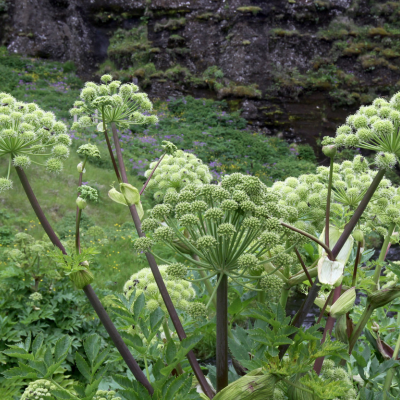Angelica
Angelica archangelica Family: Umbellifereae

Overview
Angelica is a biennial plant native to northern Europe and Iceland, valued for its aromatic and medicinal properties. Historically revered by monks for its protective qualities, Angelica has a rich folklore background and is traditionally used for respiratory and digestive support.
Traditional Uses:
- Supports relief from coughs, bronchitis, and pleurisy
- Acts as an appetite stimulant
- Helps regulate women's menstrual cycle
Spiritual Uses:
- Protection, uncrossing in folk practices. Use in a mojo bag or burn in an incense blend
Caution:
Avoid taking very large amounts; repeatedly touching leaves may cause dermatitis
Fun Fact: Medieval monks made medicines from Angelica to help treat the plague; it has been said that its name was given by a monk when Archangel Raphael descended and said it was a treatment for the plague.
Parts Used: Roots, leaves
Applications:
1-2 tsp root decocted in 1 Cup boiling water or 1oz dried root for 1 pint of water, boil for 2 minutes then let stand, covered, for 15 mins, take 1 Cup three times a day; 15-30 drops tincture three times daily; a compress can be made with the leaves and placed on the chest
Habitat & Growing Conditions
Likes moist soil in full to partial shade. Grown in USDA zones 4–9.
Properties:
Key Constituents:
Sources:
The New Holistic Herbal, David Hoffmann p175
Herbs An Illustrated Encyclopedia, Kathi Keville p38
These statements have not been evaluated by the Food and Drug Administration. This product is not intended to diagnose, treat, cure, or prevent any diseases. If you are under the care of a health care provider and/or taking prescription medication, check with your health care provider before taking any herbal supplement.


